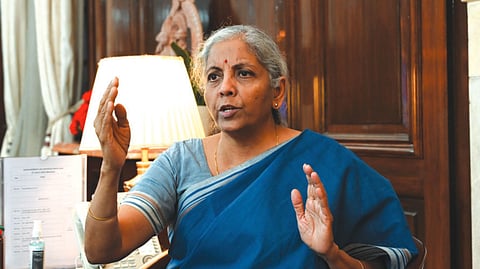

MUMBAI: Finance minister Nirmala Sitharaman has asked banks to make borrowing more affordable as the current “cost of borrowing is very stressful” from some.
The Reserve Bank-led rate-setting panel MPC has not changed the interest rates since February 2023 when it raised the key lending (repo) rate by an unconventional 35 bps to 6.5 per cent. The rates were left unchanged for the tenth time in the October policy as well as retail inflation still remains above the tolerance level.
With the October numbers printing in at a steep 6.21 per cent, up from 5.65 per cent in the previous month, a rate cut change has completely evaded in the forthcoming December policy review. The market was expecting a 25 bps cut next month after all key central banks led by the US Fed cut rates by 75 since September and so did the European central and that of the British and Australian monetary authorities.
“What is important is that when you look at our growth requirements, and you have so many different voices coming out and saying the cost of borrowing is very stressful, and a time when we want industries to ramp up and move (to) building capacities, interest rates will have to be far more affordable,” Sitharaman was quoted by the news agency PTI as saying a SBI function here Monday.
Since May 2020, in the aftermath of the global pandemic, the RBI has slashed the repo rates by a 290 bps to a record low of 4 per cent. But as the pandemic-related supply side issues normalised, the Russian invasion of Ukraine sent prices of key commodities soaring, leading to record high inflation globally including here, forcing RBI to keep on raising the cost of funds.
While high interest rate has kicked the money market rates up to a similar quantum as that of the repo spike, taking the average weighted average borrowing cost to 9.91 per cent as of September 2024, the monetary transmission - the changes of monetary policy on actual lending rates - has not happened in a commensurate manner yet.
The weighted average call rate was at the repo level of 6.50 per cent in the September. The weighted average call rate is the overnight cost of borrowing for banks and is the operating target of the monetary policy. This rate falls when the banking system has surplus liquidity. While in September the average bank lending rate was 9.91 per cent, from 2012 to 2024, the average bank lending rate was 10.61 per cent.
The finance minister’s statement comes amidst rising concerns about a possible growth slowdown but she said the government is fully aware of both the domestic as well as global challenges, and that there is no need to have "undue concerns".
One of the key worries the about growth engine losing steam is the falling demand from urban consumers while rural demand has been on an upswing after a good monsoon but not strong enough to offset the slacking urban demand.
While the June quarter growth underwhelmed with a 6.7 per cent print, which was a six-quarter low mostly due to the general elections which tied the government's hands from spending, even Q2 is projected to a multi-year low of 6.3-6.5 per cent as the lingering impact of the Q1 is not over yet. These numbers come after a surprise 8.2 per cent clip in the fully year to March 2024. This unexpected boost has had the RBI revising upwards its 7 per cent growth projection for this fiscal penciled in the April policy to 7.2 percent in the June policy.
Even in the October review the central bank has retained this high level of growth.Last week international rating agency Moody’s projected the economy to be clipping at 7.2 per cent in the calander year 2024, saying the economy is in a sweet spot. This would mean that the December quarter has to really do some heavy lifting.